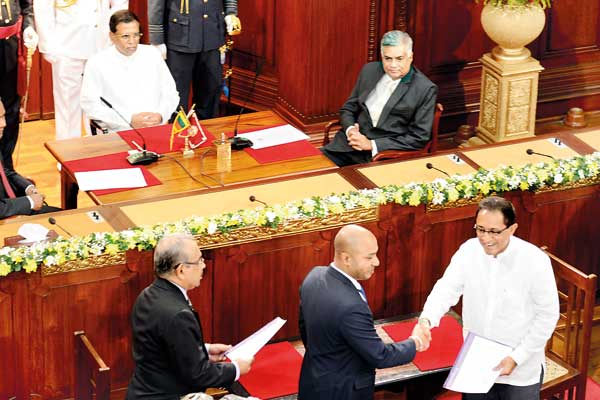25 Aug 2015 - {{hitsCtrl.values.hits}}

.jpg) One of the major concerns of the Sri Lankan economy was the current account deficit in the Balance of Payments (BoP) coupled with the depletion of the external foreign reserves. Sri Lanka’s trade deficit widened in July 2015 as exports fell dragged down by lower export earnings. However, the oil import bill has come down significantly and that alone should have given a positive BoP. Further, the import prices of rice and sugar also declined compared to the corresponding period in 2014. During the year, the Sri Lankan rupee depreciated against the US dollar over 4 percent. The rupee closed at 134.00 per US dollar last week with the Central Bank intervening to keep the currency falling while printing money to keep interest rates down. “I don’t know how long we can hold this currency as exports are falling,” said Dr. Harsha de Silva, Policy Planning and Economic Affairs Deputy Minister of the interim government.
One of the major concerns of the Sri Lankan economy was the current account deficit in the Balance of Payments (BoP) coupled with the depletion of the external foreign reserves. Sri Lanka’s trade deficit widened in July 2015 as exports fell dragged down by lower export earnings. However, the oil import bill has come down significantly and that alone should have given a positive BoP. Further, the import prices of rice and sugar also declined compared to the corresponding period in 2014. During the year, the Sri Lankan rupee depreciated against the US dollar over 4 percent. The rupee closed at 134.00 per US dollar last week with the Central Bank intervening to keep the currency falling while printing money to keep interest rates down. “I don’t know how long we can hold this currency as exports are falling,” said Dr. Harsha de Silva, Policy Planning and Economic Affairs Deputy Minister of the interim government.
26 Nov 2024 6 hours ago
26 Nov 2024 7 hours ago
26 Nov 2024 8 hours ago
26 Nov 2024 9 hours ago
26 Nov 2024 9 hours ago